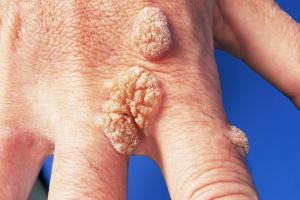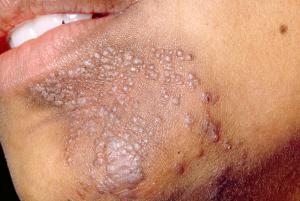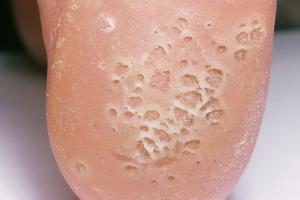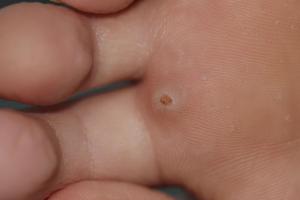Warts and verrucas
Warts are small lumps that develop on the skin, caused by a viral infection. Verrucas are a type of wart that affect the bottom of the feet. Most people will have warts at some point. They usually go away on their own, but it can take months or even years.
About warts and verrucas




Warts are small, rough growths which are caused by certain strains of the human papilloma virus (HPV).
Warts and verrucas come in all shapes and sizes. They can affect any part of the body. But are more common on the hands and feet.
Warts and verrucas can be spread to other people through close skin contact or contact with contaminated objects or surfaces, such as:
- towels
- shoes and socks
- areas surrounding swimming pools
- floors of communal changing areas
You're more likely to get infected if your skin is wet or damaged. After becoming infected, it can take weeks or even months for a wart or verruca to appear.
Warts:
- tend to be round or oval-shaped (although some are long and thin)
- are usually firm and raised
- have a rough, irregular surface similar to a cauliflower (although some are smooth)
- vary in size, from less than 1mm to more than 1cm across
- can appear on their own or in a group
Verrucas:
- develop on the soles of the feet
- are white, often with a black dot in the centre
- tend to be flat rather than raised
- can be painful if they're on a weight-bearing part of the foot
Your pharmacist can help with warts and verrucas
Most warts and verrucas will eventually clear up without treatment.
You can also buy creams, plasters and sprays from pharmacies to get rid of warts and verrucas.
These treatments can take up to three months. They may irritate your skin and don’t always work. You shouldn’t use these treatments on your face.
Always check the leaflet that comes with the medication to check it's suitable and to see how to use it.
Your pharmacist can give you advice about the best treatment for you.
While you have a wart or verruca, you should also take steps to avoid passing it to others.
When to see your GP
See your GP if:
- you're not sure whether a lump is a wart pharmacy treatments haven't worked
- you have a wart on your face or genitals – don't treat these yourself
- you have lots of warts or get warts often
- a wart bleeds, changes in appearance, spreads or causes significant pain, distress or embarrassment
If pharmacy treatments haven't helped, your GP may try freezing the wart off with liquid nitrogen (cryotherapy).
This will take a number of sessions and can be painful. It can also sometimes lead to blistering, infection and scarring.
If this doesn't work, they may be able to refer you to a skin doctor (dermatologist) for specialist treatments such as a minor operation, laser therapy or stronger creams.
If you have genital warts you should be treated at a sexual health or GUM clinic. This is so you can be checked for other infections (unless your GP is able to provide specialist sexual health services).
Preventing warts and verrucas
It's difficult to prevent warts and verrucas completely. The following can help stop them spreading:
- avoid touching other people's warts – wash your hands after touching your own wart
- avoid sharing towels, flannels, shoes and socks with other people
- keep your feet and hands clean and dry
- change your socks every day
- don't go barefoot in public places
- cover warts and verrucas with a waterproof plaster or a verruca sock when swimming
- avoid scratching or picking at warts or verrucas – this may spread the infection to other parts of your body
- take care when shaving because warts can spread if you cut yourself
More useful links
The information on this page has been adapted from original content from the NHS website.
For further information see terms and conditions.